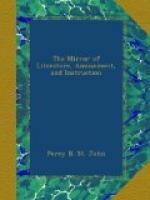At the period alluded to, law being suspended, and the courts of justice closed, the “question” by torture was revived and largely practised. The commercial exchange of Dublin formed a place of execution; even suspected rebels were every day immolated as if convicted on the clearest evidence; and Lieutenant H——’s pastime of hanging on his own back persons whose physiognomies he thought characteristic of rebellion was (I am ashamed to say) the subject of jocularity instead of punishment. What in other times he would himself have died for, as a murderer, was laughed at as the manifestation of loyalty: never yet was martial law so abused, or its enormities so hushed up as in Ireland. Being a military officer, the lieutenant conceived he had a right to do just what he thought proper, and to make the most of his time while martial law was flourishing.
Once, when high in blood, he happened to meet a suspicious-looking peasant from County Kildare, who could not satisfactorily account for himself according to the lieutenant’s notion of evidence; and having nobody at hand to vouch for him, the lieutenant of course immediately took for granted that he must be a rebel strolling about, and imagining the death of his Most Gracious Majesty.[7] He therefore, no other court of justice being at hand, considered that he had a right to try the man by his own opinion; accordingly, after a brief interrogation, he condemned him to die, and without further ceremony proceeded to put his own sentence into immediate execution.
[7] The lieutenant’s brother being a Crown solicitor, had now and then got the lieutenant to copy the high treason indictments: and he, seeing there that imagining the death of a king was punished capitally, very naturally conceived that wishing it was twice as bad as supposing it: having therefore no doubt that all rebels wished it, he consequently decided in the tribunal of his own mind to hang every man who hypothetically and traitorously wished his majesty’s dissolution, which wish he also conceived was very easily ascertained by the wisher’s countenance.
A cabinet-maker, at Charing Cross, some years ago, put on his board “patent coffin-maker to his majesty:” it was considered that though this was not an ill-intentioned, yet it was a very improper mode of imagining the king’s death, and the board was taken down accordingly. Lieutenant H. would surely have hanged him in Ireland.
However, to do the lieutenant justice, his mode was not near so tedious or painful as that practised by the grand signior, who sometimes causes the ceremony to be divided into three acts, giving the culprit a drink of spring water to refresh him between the two first; nor was it so severe as the burning old women formerly for witchcraft. In fact, the “walking gallows” was both on a new and




